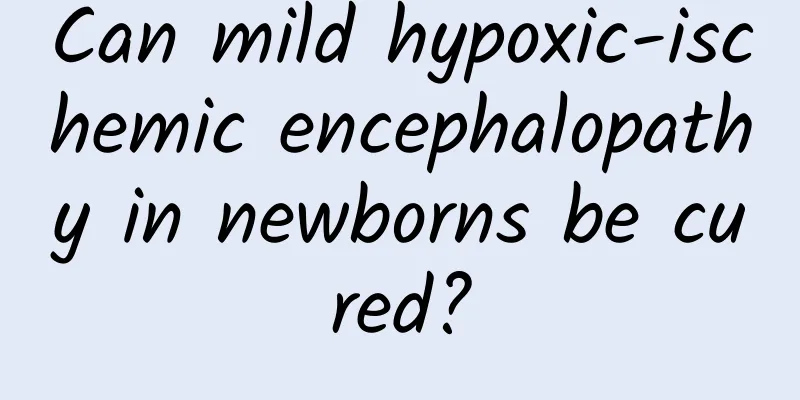Can mild hypoxic-ischemic encephalopathy in newborns be cured?

|
Newborns are prone to ischemic encephalopathy, which has a great impact on the child. If it is a mild ischemic encephalopathy, it should be treated in time. If the child responds well and eats well, the problem is generally not very serious. Of course, it should be treated in time. However, for more serious ischemic encephalopathy, it is generally more difficult to recover, and it also has a greater impact on the child's intelligence. Can neonatal hypoxic-ischemic encephalopathy be cured? Neonatal hypoxic-ischemic encephalopathy refers to hypoxic-ischemic damage to the brain caused by perinatal asphyxia. The main lesions of the brain tissue are edema, softening, necrosis and hemorrhage. It is one of the important complications of neonatal asphyxia and one of the common causes of neurological disability in children. Severe cases often have sequelae, such as cerebral palsy, mental retardation, epilepsy, deafness, visual impairment, etc. This disease not only seriously threatens the life of newborns, but is also one of the most common causes of disability in post-neonatal children. So, can neonatal hypoxic-ischemic encephalopathy be cured? As long as it is discovered early, this disease can be cured. Here are some common treatments for neonatal hypoxic-ischemic encephalopathy. 1. General treatment 1. Keep quiet, breathe oxygen, keep warm, and keep the airway open. 2. Correct acidosis. People with coagulation disorders can be given vitamin K15 mg/d, or blood or plasma transfusions. Correct hypoglycemia, hypocalcemia, etc. in a timely manner. 3. Maintain good ventilation function, keep PaO2 at 50-70 mmHg (6.65-9.31 kPa) and PaCO2 normal. 4. Maintain good circulatory function and keep the heart rate and blood pressure within normal range to ensure blood perfusion of various organs. If necessary, 2-5 g/(kg·min) of dopamine can be used. 5. Maintain blood sugar levels at normal levels to ensure the energy required for brain metabolism. 2. Intensive Care Carry out cardiopulmonary, blood pressure, intracranial pressure and EEG monitoring, and closely observe body temperature, respiration, consciousness, eye movement, pupil size, anterior fontanelle and the presence of early convulsions. Maintain blood gases and pH within normal range. When heart failure and shock occur, timely treatment is required. Treatment and early intervention after the neonatal period For newborns with HIE, after their condition stabilizes, early intellectual and physical rehabilitation training should be carried out according to the specific circumstances of the child, which will help promote the recovery of brain function and reduce the occurrence of sequelae. Symptoms of neonatal hypoxia The symptoms of neonatal cerebral hypoxia are divided into three categories according to their degree: 1. Mild: hyperarousal, irritable, excited and highly agitated (shaking, tremor), normal muscle tone, active hugging reflex, normal sucking reflex, stable breathing, no convulsions. The symptoms usually disappear gradually within 3 days and the prognosis is good. 2. Moderate: Depressed state, drowsiness or light coma, hypotonia, 50% of cases have convulsions, respiratory arrest and weakened hugging and sucking reflexes. The decrease in muscle tone in the upper limbs of full-term babies is more serious than that in the lower limbs, suggesting that the lesion involves the parasagittal sinus area. If a premature baby shows that the lower limb muscle tone is more severe than the upper limb, it indicates that the lesion is periventricular leukomalacia. If symptoms persist for more than 7-10 days, there may be sequelae. 3. Severe: The child is in a coma, with extremely low and loose muscle tone, disappearance of hug reflex and tendon reflex, unequal pupils, poor reaction to light, bulging anterior fontanelle, frequent convulsions, irregular or stopped breathing, and even respiratory failure. The mortality rate among children with severe disease is high, and survivors often have sequelae. |
<<: What is cerebral infarction? Is it serious?
>>: What to do if cervical spondylosis causes dizziness and insufficient blood supply to the brain
Recommend
The medicinal value of cockroaches
In everyone's memory, cockroaches are one of ...
Chinese medicine for treating phobia
Being under constant stress can cause mental illn...
The efficacy, effects and contraindications of Astragalus, Atractylodes and Saposhnikovia
Scutellaria baicalensis, Radix Scutellariae and S...
Auscultatory features of mitral stenosis
Mitral stenosis is a relatively special heart dis...
There are several functions of Chonglou
Tripterygium wilfordii is actually what we call f...
The difference between black stool and tarry stool
Our human body basically defecates once a day, wh...
What causes itching in the ears?
We cannot cover our heads all day long, so our he...
Which type of dendrobium is best?
Dendrobium nobile Lindl (Alias: Dendrobium nobile...
Which oral anti-inflammatory drug is best?
Anti-inflammatory drugs are a relatively commonly...
What to eat will cause immediate fetal death
In addition to being caused artificially, stillbi...
It turns out that this is how women in menopause maintain their health
After menopause, women will experience some chang...
Dandelion, chrysanthemum, honeysuckle, efficacy
Dandelion is a common Chinese medicine, and it is...
What causes chest tightness and shortness of breath? Two common situations
There are two common situations of chest tightnes...
What foods can cure cough?
Coughing often occurs when we don't pay atten...
What causes eczema on the back of the hands
The symptom of eczema on the back of the hands is...









